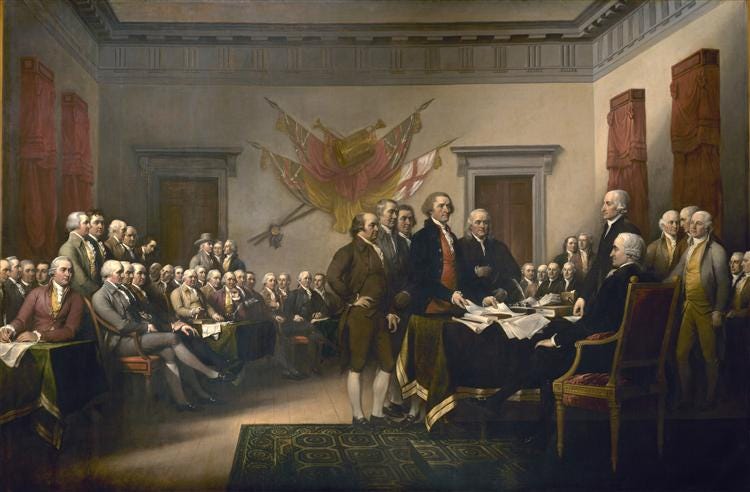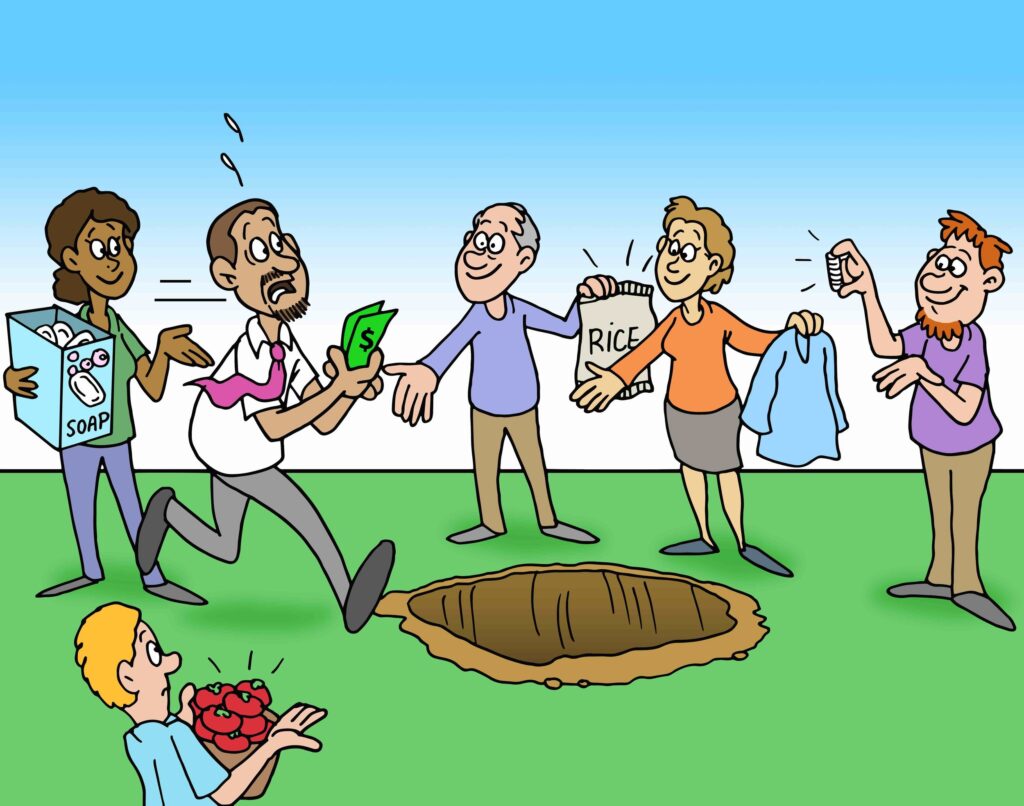
It is difficult to step back from tragedy and remember a picture bigger than the chaos before us. Doing so leads to the mindset essential to moving ahead. Renowned political thinker Hannah Arendt spoke of how memory shapes the future—knowing how we got to where we are is the key to knowing where to go next. “What has been can be again—this is what our memory tells us in hope or fear.”
In 2024, many voters chose Trump not despite his explicitly authoritarian program but because of it. More of us speak of Trump’s resemblance to Hitler than of our resemblance to the German public. A growing number of Americans have become not just tolerant but affirming of authoritarianism.
In an era not long past, many Germans, while not fanatical Nazis, supported Hitler’s rule because it fulfilled enough of their desires and aspirations to overlook the rest. The atrocities of fascism overshadow the harsh conditions that enabled its rise: beyond the punitive Treaty of Versailles, a class-conscious and culturally pretentious bureaucracy denigrated the working class, silenced its political voice, and favored an avant-garde known for its moral laxity. For the first time, ordinary Germans felt their government—despite being a fascist tyranny—was deliberately acting in their interest. And as one woman remarked, “Say what you will about him, but with Adolf, at least there was no crime.”
Though perspectives evolved as the full horror of the Holocaust became known, many citizens felt Hitler’s greatest failure was not the brutality already known or heard about but his failure to keep his promises. He did not save the working class, the economy, or the nation.
In her overlooked classic, The Authoritarian Dynamic (2005), political psychologist Karen Stenner predicted the rise of extremist figures under precisely the conditions we face today. She demonstrated that authoritarianism isn’t confined to right-wing extremists but crosses the political spectrum, including the left and the general public. This makes apparent a dilemma for democracy.
We have long known that the “anti-democratic personality” harms democracy. The harder lesson is that democracy’s freedoms and diversity can trigger authoritarian instincts regardless of politics or personality. Liberty and justice for all include those who disagree, sometimes vehemently, leaving us between a rock and a hard place: how can a commitment to democratic values include the freedom to promote values that threaten them?
Groupthink exacerbates conditions by suppressing dissent and critical thinking, leading to autocratic decision-making within cohesive groups. Fundamentalism is not limited to “fundamentalists.” The roots of our immigration dysfunction span decades and touch on nearly every polarizing issue in the U.S. today: race, the economy, globalization, and our definition of what it means to be American. As a result, pursuing security and predictability may drive individuals to forsake democratic values in favor of authoritarianism, regardless of their political or religious beliefs.
The old remark attributed to Mark Twain rings true again: “History does not repeat itself, but it rhymes.” It rhymes with my upbringing under a right-wing dictatorship in Latin America. In the mid-fifties, oil-rich Venezuela’s Marcos Perez Jimenez restored overdue economic prominence and political stability after years of weak-kneed democratic rule. University and other left-wing opposition to wealthy foreign oil companies meant little next to the business acumen the government employed to its advantage. Meanwhile, foreign companies could retain 90% of their revenue. When the dictator was finally overthrown, years of would-be democracy followed and failed as the nationalization of big oil promoted corrupt and incompetent management, resulting in dictatorial rule worse than ever, this time on the Left.
Donald Trump will fall not because of his cruelty or extremism, but because of his incompetence. As his corruption regains headlines, whatever the courts do, corporate donors will increasingly withdraw. Many companies are holding the line on DEI on the grounds of good business. Unless there is a drastic change that is not rescinded the next day, Trump’s corporate credibility will crumble, raising the question of how much more damage will be done and how many more lives will be affected before Trump is through.
Getting rid of a dictator never saved a nation, just as the drowning of Melville’s Captain Ahab didn’t save the Pequod. Moby Dick rams and destroys the ship, killing nearly the entire crew. Post-World War II, Germany required the largesse of the Marshall Plan to survive. Despite leading Britain to victory, Winston Churchill lost his subsequent election amid economic hardship. Venezuela’s shift from a right-wing dictatorship to a left-wing one illustrates the instability of factional transitions. George Washington, anticipating instability, warned against institutionalized political parties, viewing factionalism as democracy’s greatest threat.
As memory could recall, “in hope or fear,” the Left and Right need each other for democracy to survive. The traditional binaries that once defined political discourse —left/right, liberal/conservative, state/market, capitalism/justice—are increasingly inadequate. These labels don’t fit today’s world. Like many older independents, young voters increasingly exemplify this evolution, often supporting conservative economic policies while backing progressive social causes.
This kind of tension resonates within us across the political spectrum—and throughout all great art and literature. Can you explain Mona Lisa’s smile? Whose personality doesn’t embody fundamental contradictions—which novel worth reading? The more fervent our ideals, the more likely we will be caught in a bind. As Walt Whitman wrote, “Do I contradict myself? Very well then I contradict myself, (I am large, I contain multitudes.)”
Democracy’s call today is to become truer to who we already are. History has long known the truth.
Notes and reading
“Democracy is made safe for the world by being radically transformed at home.” – The Presence of the Past: Essays on the State and the Constitution – Sheldon Wolin (1989), 207 passim. Wolin was a professor of politics at Oxford, University of California (Berkeley), and Princeton.
Hannah Arendt – On Violence (1970), The Human Condition (2018). – Arendt was an influential political philosopher, renowned for her insights into the 20th century’s defining events.
Hitler’s People: The Faces of the Third Reich – Richard J. Evans (2024), Part I, Conclusion. Evans is one of the world’s leading historians of modern Germany.
The Authoritarian Dynamic – Karen Stenner (2005). Stenner is a political psychologist and founder of Insight-Analytics (Australia). Stenner’s work is a critical complement to better-known historians and political commentators (e.g., Ruth Ben-Ghiat) who focus on “strongmen” rather than the public’s predispositions that draw them to their power.
Marcos Pérez Jiménez – Judith Ewell, Indictment of a Dictator (1981). After exile in the Dominican Republic and Florida, Perez Jimenez was imprisoned in Miami and returned to Venezuela to be jailed before spending the rest of his life in Spain. – Ewell is a history professor at the College of William and Mary.
Washington: A Life – Ron Chernow (2011). – “The best, most comprehensive, and most balanced single-volume biography of Washington ever written.” – The New York Review of Books.
Walt Whitman – “Do I contradict myself?” Song of Myself, 51.
Prague 22: A Philosopher Takes a Tram through a City – Raymond Tallis (2025 – Amazon UK) – a meditation on the interplay between place and identity. Prague is portrayed as a backdrop and a character influencing thought and emotion. – Tallis is a philosopher, poet, novelist, cultural critic, retired physician and clinical neuroscientist.
The Age of Trump Has Its Prophet: Pope Francis – David Gibson, director of the Center on Religion and Culture at Fordham University (New York Times – March 13, 2025).
“Courageous craftsmanship: Pope shows how to be an artisan of peace” – The Byzantine Catholic Archeparchy of Pittsburgh (April 25, 2022).
Tip-Off #189 – The new chic
Tip-Off #188 – Rugged Democracy
About 2 + 2 = 5




